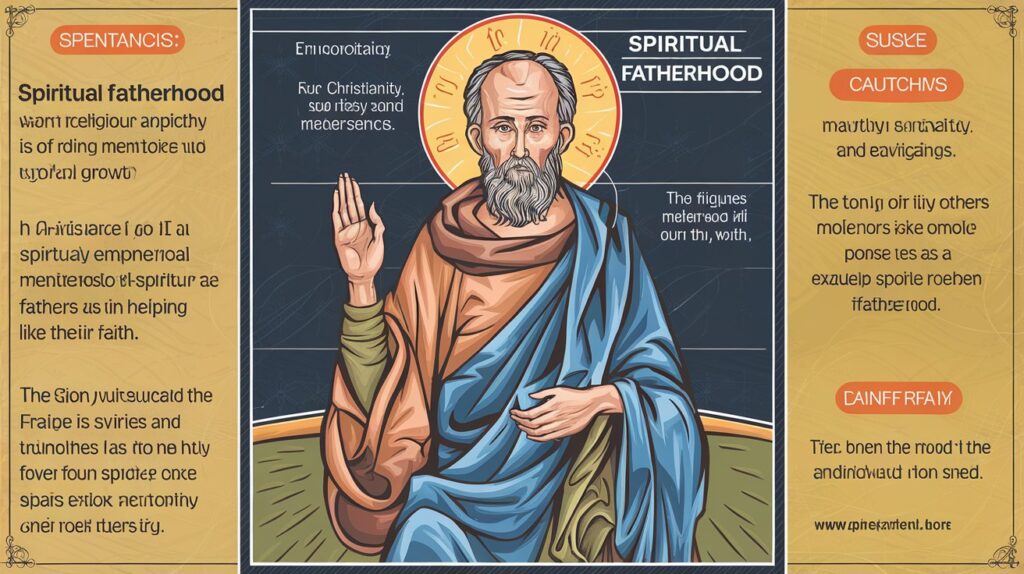Spiritual Fatherhood Right or Wrong? Exploring Different Perspectives
spiritual fatherhood right or wrong is a concept that has emerged in various religious and spiritual communities. It refers to the role someone plays in guiding, mentoring, and providing spiritual direction to others. This type of fatherhood is not necessarily tied to biological relationships, but rather to one’s responsibility to nurture and support others on their spiritual journeys. However, the concept of spiritual fatherhood raises several important ethical and moral questions. Is spiritual fatherhood right or wrong morally and ethically acceptable? Are there inherent dangers in assuming this role? In this article, we will explore different viewpoints and religious perspectives on spiritual fatherhood, addressing the potential benefits and concerns associated with it.
Understanding Spiritual Fatherhood
At its core, spiritual fatherhood right or wrong is about guiding someone, often a younger or less experienced individual, through spiritual growth and development. It is a relationship founded on trust, mentorship, and the sharing of wisdom. Spiritual fathers are often seen as figures of authority who provide both emotional and spiritual support, offering advice, teachings, and counsel.

In many religious traditions, spiritual fatherhood plays an essential role in the spiritual upbringing of individuals. For instance, in Christianity, spiritual fathers are seen as those who help others grow in faith, providing wisdom and encouragement in their journey toward spiritual maturity. The Bible contains various references to spiritual mentorship, where figures like Paul and Timothy serve as examples of spiritual fatherhood.
But is it right or wrong for someone to take on this role? The answer depends on a variety of factors, including the context in which spiritual fatherhood is practiced, the motivations of the person assuming the role, and the expectations placed on those being mentored.
Different Perspectives on Spiritual Fatherhood
Religious Perspective: A Guiding Principle
From a religious standpoint, many view spiritual fatherhood right or wrong as a necessary and positive role. Spiritual fathers help individuals navigate their spiritual paths and offer wisdom and support in times of need. In Christianity, the concept of spiritual fatherhood is rooted in the biblical tradition, where God is often described as a father figure, providing guidance to His people. The role of a spiritual father is seen as an extension of this divine guidance.
In the Catholic Church, for example, priests take on the role of spiritual fathers to their congregants. They offer counsel, perform sacraments, and help guide individuals toward moral and spiritual maturity. This form of spiritual fatherhood is viewed as an extension of the church’s mission to care for and guide the faithful.
Similarly, in the Muslim faith, spiritual mentorship is highly valued. Islamic scholars and imams serve as spiritual fathers to their communities, providing guidance on religious matters and offering emotional and moral support.
Ethical Concerns: The Potential Dangers of Spiritual Fatherhood
However, there are ethical concerns surrounding the concept of spiritual fatherhood. While the intention behind spiritual fatherhood right or wrong is often positive—helping individuals grow in their faith and spirituality—the power dynamic involved can sometimes lead to problematic situations.
One of the main concerns is the potential for manipulation or abuse of power. A spiritual father often holds a position of authority, and this power can be exploited if not handled responsibly. If the individual assuming the role of spiritual father is not fully committed to the well-being of those they mentor, there is the possibility of unhealthy relationships forming. The trust that comes with this role can easily be broken, leading to emotional, psychological, or even spiritual harm.

Additionally, the relationship between a spiritual fatherhood right or wrong and a mentee is often intensely personal. This personal connection can make it difficult for the individual being mentored to question or challenge the guidance they receive, even if it may not be in their best interest. As a result, spiritual fatherhood can sometimes foster a dependency that undermines the autonomy and personal growth of the mentee.
Psychological and Emotional Impact
spiritual fatherhood right or wrong can also have psychological and emotional implications. Those who rely heavily on a spiritual father for guidance may develop a sense of inadequacy or self-doubt when they are unable to live up to the expectations placed upon them. This pressure can lead to feelings of shame or guilt, especially if the mentor’s expectations are unrealistic or overly demanding.
Another potential issue is the idealization of the spiritual father. When a mentor is placed on a pedestal, it becomes difficult for the mentee to see them as a human being with flaws. This can lead to disillusionment if the mentor falls short of the mentee’s expectations or behaves in a way that contradicts the ideals they initially represented.
Cultural and Social Perspectives on Spiritual Fatherhood
In different cultural and social contexts, spiritual fatherhood may be viewed in various ways. In some cultures, the concept of fatherhood extends beyond biological ties, and a mentor or elder is revered as a father figure, regardless of blood relation. This understanding of fatherhood may make spiritual fatherhood more acceptable, as it is seen as part of a broader cultural practice of mentorship and guidance.
In other societies, however, the idea of a single person assuming such a powerful role over someone else’s spiritual development may be met with skepticism. In modern secular contexts, the concept of spiritual fatherhood may seem antiquated or overly paternalistic. Individuals may question whether it is appropriate for one person to assume such a significant position of authority over another’s spiritual journey. spiritual fatherhood right or wrong
The Spiritual Difference Between Managers and Directors: Leadership Through a Spiritual Lens
While the spiritual difference between managers and directors is an interpersonal and intimate concept, it is also important to consider the role of spiritual principles in leadership and management. The roles of managers and directors are often seen through the lens of professional responsibility, but what happens when we look at these positions from a spiritual perspective?

Managers and directors may not have the same direct mentorship responsibilities as spiritual fathers, but their leadership styles and decision-making processes can still be informed by spiritual fatherhood right or wrong principles. The spiritual difference between managers and directors lies in how they approach their roles, particularly in terms of ethical decision-making, empathy, and their ability to guide others toward growth and development.
The Role of Spirituality in Management
the spiritual difference between managers and directors are often tasked with overseeing day-to-day operations, ensuring that things run smoothly and that the team is working efficiently. From a spiritual perspective, effective managers are those who lead with integrity, empathy, and a sense of purpose. They must balance the practical aspects of their work with a deep understanding of the human side of leadership. A spiritually grounded manager may focus on building relationships with their team, fostering an environment of trust and collaboration.
The Role of Spirituality in Directorship
the spiritual difference between managers and directors, on the other hand, typically operate at a higher level within an organization. They are responsible for strategic decision-making and overseeing the overall direction of the company or institution. While their role may involve less direct interaction with employees, the spiritual dimension of their leadership is no less important. A spiritually-minded director may focus on ensuring that the organization’s values align with their personal ethical beliefs and the well-being of their stakeholders. They have the power to influence the culture and vision of the entire organization, and their decisions can have far-reaching consequences.

The spiritual difference between managers and directors can be seen in the ways they balance the practical and ethical aspects of their roles. While both need to be effective leaders, a spiritually grounded director or manager will prioritize the growth and development of those they lead, as well as the long-term sustainability of the organization.
Conclusion: spiritual fatherhood right or wrong ?
spiritual fatherhood right or wrong is a concept that is not without its ethical and moral challenges. While it can be a powerful and transformative relationship, it also has the potential for abuse if not approached with care, responsibility, and humility. Whether spiritual fatherhood right or wrong depends largely on the intentions of the individual taking on this role, the context in which it is practiced, and the safeguards in place to ensure that the relationship remains healthy and empowering for all parties involved.
Ultimately, the ethical considerations surrounding spiritual fatherhood right or wrong require careful reflection and a deep commitment to the well-being of those being mentored. Spiritual fatherhood should never be about control or manipulation; rather, it should be about guiding others on their path to spiritual growth and maturity. When practiced with love, respect, and humility, spiritual fatherhood right or wrong can be a positive and life-changing experience for both the mentor and the mentee.

As we explore the spiritual differences between managers and directors, we are reminded that leadership, at its core, is about fostering growth and development in others. Whether in the workplace or in spiritual mentorship, the principles of integrity, empathy, and ethical decision-making should always be at the heart of our leadership approach. spiritual fatherhood right or wrong
